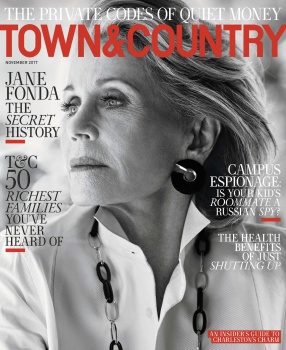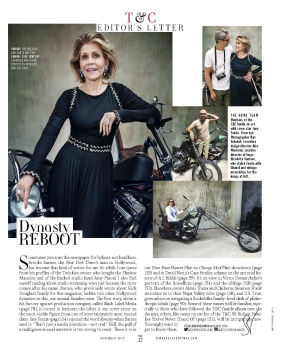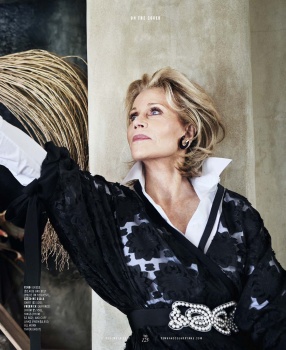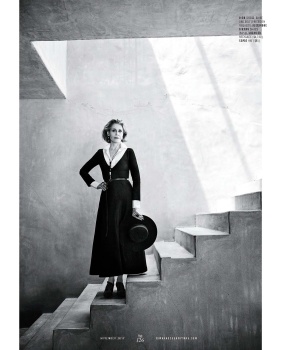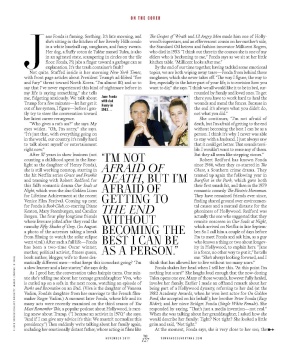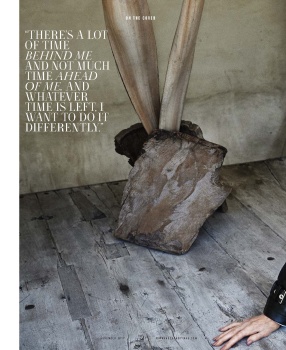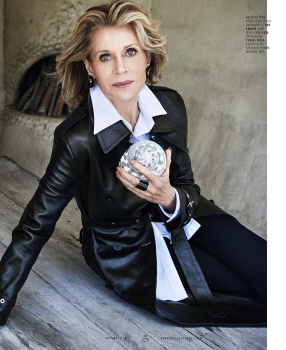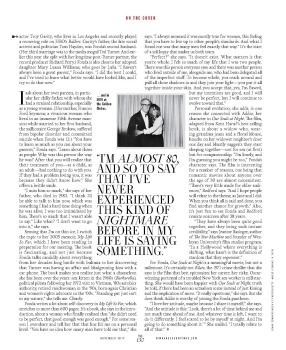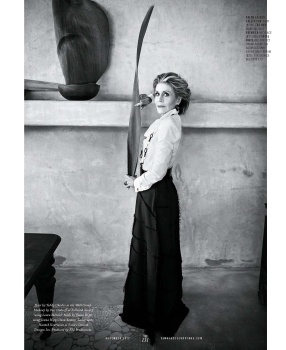You are using an out of date browser. It may not display this or other websites correctly.
You should upgrade or use an alternative browser.
You should upgrade or use an alternative browser.
Jane Fonda
- Thread starter Caterina_Italia
- Start date
Nymphaea
Well-Known Member
- Joined
- Oct 30, 2012
- Messages
- 6,196
- Reaction score
- 695
The Edit by Net-A-Porter
March 2, 2017
Me, Jane
Model Jane Fonda
Photographer Nico Bustos
Styling Simon Robins









March 2, 2017
Me, Jane
Model Jane Fonda
Photographer Nico Bustos
Styling Simon Robins









net-a-porterJane Fonda has been an activist for almost 50 years. This International Women’s Day, as the fight for gender equality intensifies, her fellow Oscar-winning crusader, Brie Larson, quizzes the icon on feminism, fear and how we can facilitate change
Brie Larson: When I started acting I told people, “Filmmaking is my form of activism,” and they replied, “You’ve got to meet Jane. She will be your anchor.” I’ve felt the signs were pointing to you for years, so I’m honored to be having this conversation with you now.
Jane Fonda: Thank you, that means a lot.
Bl: At what moment did you first identify as a feminist?
Jf: I grew up in the ’50s and it took me a long time to apply feminism to my life. The men in my life were wonderful, but victims of a [patriarchal] belief system. I felt diminished. Eventually I decided I wasn’t going to give up who I was in order to please the man I was with. I became an embodied feminist when I was single and saw Eve Ensler perform The Vagina Monologues. While I was laughing, my feminism carried from my head into my Dna. It took a long time, though, because I was brought up with the disease to please…
Bl: A lot of women suffer from that disease.
Jf: No kidding. To show you the extent to which a patriarchy takes a toll on females; I’ve been raped, I’ve been sexually abused as a child and I’ve been fired because I wouldn’t sleep with my boss and I always thought it was my fault; that I didn’t do or say the right thing. I know young girls who’ve been raped and didn’t even know it was r*pe. They think, “It must have been because I said ‘no’ the wrong way.” One of the great things the women’s movement has done is to make us realize that [r*pe and abuse is] not our fault. We were violated and it’s not right.
Bl: Having played two characters who were sexually abused, I’ve done a lot of work with victims of sexual abuse. We can’t take any steps backward in allowing people to think abuse is their fault. It’s the people-pleaser disease.
Jf: It’s an epidemic…
Bl: What do you say to those who think ‘celebrities’ don’t have a right to speak their mind on issues?
Jf: Everyone has the right to speak up; it doesn’t matter what you do. Whenever there’s been an important revolution or social upheaval, artists, actors, writers and poets are always the people that can reach into areas that politics can’t. Recently I was in Alberta speaking out against the [oil] pipelines. Walking through the airport, people were screaming, “Go home, we don’t want you here.” If you know you’re right – even when people call you bad words – you can keep going.
Bl: It can get wild out there when you start speaking up, especially on social media. I’ve been getting a lot of backlash recently. People say I’m an “elite”; that I don’t know what I’m talking about. When so many people tell you that, it’s easy to start believing it.
Jf: It means you’re having an effect. People want to silence you. If it didn’t matter, no one would bother saying, “Shut up.”
Bl: Did you ever feel that speaking out would hurt your career?
Jf: I didn’t become an activist until I was 31. When I found out what was really happening in Vietnam I didn’t care if I ever worked again; I considered leaving the business to become a full-time activist. My father was terrified for me. He remembered the ’50s when people’s careers were destroyed. It’s possible the [Hollywood] blacklist will be brought back.
Bl: Thank you for how vocal you were and are. It has paved the way for so many of us. Now [celebrities] don’t speak from the backseat because we’re afraid we’re going to lose our career. I’d put it all on the line and be an activist for the rest of my life because it doesn’t feel right to me to be quiet.
Jf: Your activism can be brought into film in many ways. I started making movies that reflected my values. I began as a producer with Coming Home, China Syndrome and Nine to Five. I think my acting improved when I became an activist – I see things from a broader perspective.
BL: I agree. Your sense of empathy grows. For Short Term 12, I shadowed at rehab facilities and it broke my heart. I thought, “I don’t want to be an actor; it feels so frivolous.” But then I couldn’t believe how many people saw the movie and said, “I’m going to adopt a child or I am going to donate. I had no idea this was happening.” That’s when it clicked that [film] really can make a difference. What advice do you have for this new generation of feminists?
Jf: Remember that popular activism on the street or in the office can change policy. It has in the past and it will now. I’ve been making calls to the congressional Senate offices but the phones are all down because so many people are calling. It matters.
Bl: What can people do to get their voices heard in government?
Jf: Organize at a grass-roots level: get people elected to office in the state legislators, the city councils, the school boards and so on. There are elections this year and next – you don’t have to wait every four years for a presidential election.
Bl: How do you feel this recent activism compares to other periods of activism in your life?
Jf: In the ’60s and ’70s, protests were mostly led by men and there was a macho edge to it. Activism didn’t feel as loving as it does now it’s women-led. I think that’s what’s made the difference. I mean, you saw the incredible signs [at the recent Women’s March] – whether it was for reproductive rights, or health for the disabled, or Lgbtq, they’re all issues that make up democracy.
Bl: What would you say to a woman reading this who doesn’t think things are so bad?
Jf: Where to start? Defunding Planned Parenthood: tens of millions of American women get their healthcare through Planned Parenthood. If that shuts down, it is going to be untenable. A lot of women will have nowhere to go. Our infrastructure isn’t big enough to absorb those women who don’t have health insurance and can’t afford healthcare.
Bl: With so many battles to fight, how do you stop burning out?
Jf: Honey, I am almost 80 years old. If you want to make it to the long-haul, you have to take care of yourself. I get more than eight hours sleep every night; I meditate twice a day for half an hour; I eat right; I workout. I always tell activists: “This is going to be a long struggle. We have to stay strong.”
Bl: How has your relationship with your body influenced your activism?
Jf: One reason I started my workout [Fonda’s best-selling fitness program] was because I knew that to be fully empowered, I needed to feel strong in my body. A woman once wrote to me and said, “I was brushing my teeth one morning and I found a muscle in my arm that wasn’t there before. I went to work that day and for the first time I stood up to my boss.” It’s easier to be brave when you feel strong.
Bl: You once said you wanted to give a cultural face to older women in Hollywood…
Jf: I said that in my forties in my book Women Coming of Age. I was frightened of getting old and what I do when I’m frightened is I embrace and try to understand it. Then I left the business for 15 years and thought, “That’s one thing I’ll never accomplish.” Then I came back with [2005 comedy] Monster-in-Law, and, in time, got offered this part in [Netflix Original series] Grace and Frankie and thought, “It’s happened. We’re giving a face to aging women.” People think of age as an arch: you’re born, you reach midlife, then you decline into decrepitude. But instead of being an arch, aging can be a stairway leading upward, where the older you get, the more you can evolve and become an authentic person.
Bl: I love that. Do you have any regrets in your life?
Jf: I regret that I wasn’t a better parent. I didn’t know how to do it. But you can learn, so I studied how to be a parent. It’s never too late. I am trying to make up for what I didn’t know before. When I die, I want my family to be around me. I want them to love me and I have to earn that. I’m still working at it.
Bl: What do you think about how female sexuality is portrayed on screen now?
Jf: I think it is terrifying being a young actress now. You have to get naked so much. There is even more emphasis on how you look.
Bl: Female sexuality was confusing for me. I went to auditions where they wanted a sassy, smart, sexy girl. I would arrive in sneakers and they’d say, “Come back in a mini- skirt and heels.” I would come back and blow the audition. I felt more in my body when I wasn’t dressing as a fantasy for the male gaze.
Jf: If you look at Bette Davis, Barbara Stanwyck and Mae West, they were sexy and strong but they didn’t necessarily expose anything. They were adored for it.
Bl: The first time I got a spread in a fashion magazine there was a one-off piece of clothing from the runway. I asked, “Can you only be in magazines if you’re the size of this one piece?” There was this silence. Men get custom suits or shirts made to fit, but as women, if you don’t fit into that sample you bump up against an aspect of your career you can never blossom into.
Jf: It hurts so bad!
Bl: We’d all love to get out of this cycle of abuse where our mental weight is based on our body weight. Jf: I salute you for saying that. If someone had asked me back when I started, “What are you wearing?” I’d have thought they were crazy. Julie Christie made her own goddamn dress when she won an Oscar for Darling.
Bl: What’s the best advice you’ve ever received?
Jf: It’s better to be interested than interesting. Also, that line from Alcoholics Anonymous, “‘No’ is a complete sentence.” I wish I had known that when I was younger.
Bl: I’ve learned the only power I have in my career is the word no. I couldn’t choose the jobs I got, but I could say no to jobs that weren’t right for me.
Jf: You’re way ahead of me.
Bl:Were you aware of the pay gap?
Jf: I never thought about it. I’m talking about at the height of my career in the ’70s and ’80s: I never got paid a huge amount of money – I never thought I was worth it. For me, it was just the way things were. Guys earned more. I am so glad people are feeling righteous anger about it now.
Bl: How did you manage situations where you were taken advantage of?
Jf: Very poorly. Unlike you, Brie, it took me 60 years to learn how to say no. If anyone offered me anything I would say yes. I took parts I wasn’t right for and I was taken advantage of. I didn’t know how to stand up for myself. Now, I would say, “No. This is a piece of s***. I don’t like the way you’re treating me,” and leave. If only I knew then what I do now.
See Jane in Grace and Frankie Season 3 on Netflix on March 24. See Brie in Free Fire, out April 24
Not Plain Jane
Well-Known Member
- Joined
- Mar 3, 2010
- Messages
- 15,479
- Reaction score
- 844
she looks elegant...
Not Plain Jane
Well-Known Member
- Joined
- Mar 3, 2010
- Messages
- 15,479
- Reaction score
- 844
yeah... cool brave lady 

dodencebt
Well-Known Member
- Joined
- Sep 11, 2010
- Messages
- 5,235
- Reaction score
- 2,972
I love the change of hairstyle  I know people say she did it to appear younger but I think she's just having fun. Jane doesn't strike me as someone who has a problem with her age, she knows she looks thirty years younger than she really is anyway.
I know people say she did it to appear younger but I think she's just having fun. Jane doesn't strike me as someone who has a problem with her age, she knows she looks thirty years younger than she really is anyway.
 I know people say she did it to appear younger but I think she's just having fun. Jane doesn't strike me as someone who has a problem with her age, she knows she looks thirty years younger than she really is anyway.
I know people say she did it to appear younger but I think she's just having fun. Jane doesn't strike me as someone who has a problem with her age, she knows she looks thirty years younger than she really is anyway.Not Plain Jane
Well-Known Member
- Joined
- Mar 3, 2010
- Messages
- 15,479
- Reaction score
- 844
love this last look
Similar Threads
- Replies
- 35
- Views
- 5K
- Replies
- 34
- Views
- 4K
- Replies
- 14
- Views
- 2K
Users who are viewing this thread
Total: 1 (members: 0, guests: 1)
New Posts
-
Harper's Bazaar France December 2025/January 2026 : Jacqui Louise by Drew Vickers (20 Viewers)
- Latest: MModa
-
-
Vogue France December 2025/January 2026 : Mona Tougaard & Irina Shayk by Carin Backoff (11 Viewers)
- Latest: caioherrero
-
-












